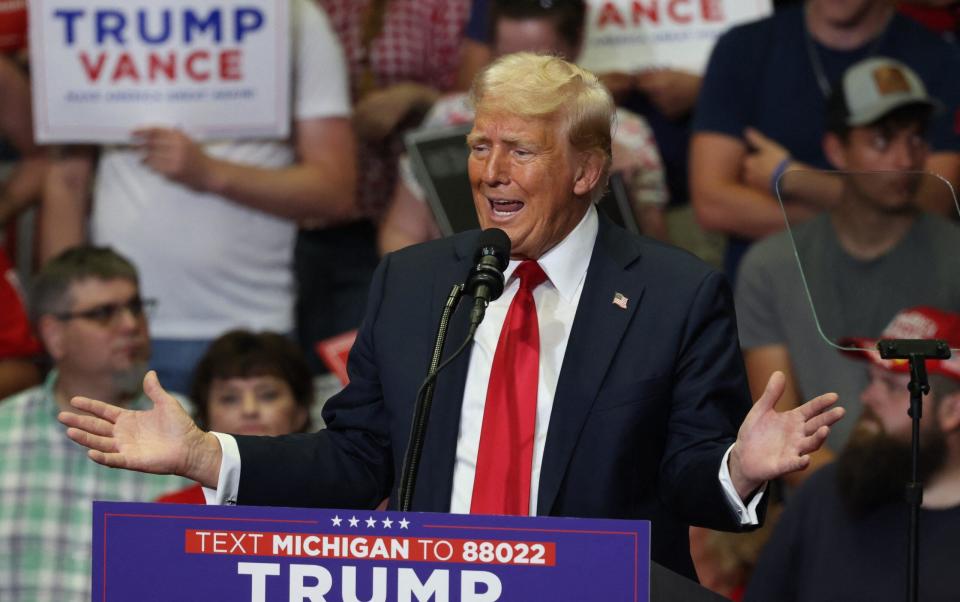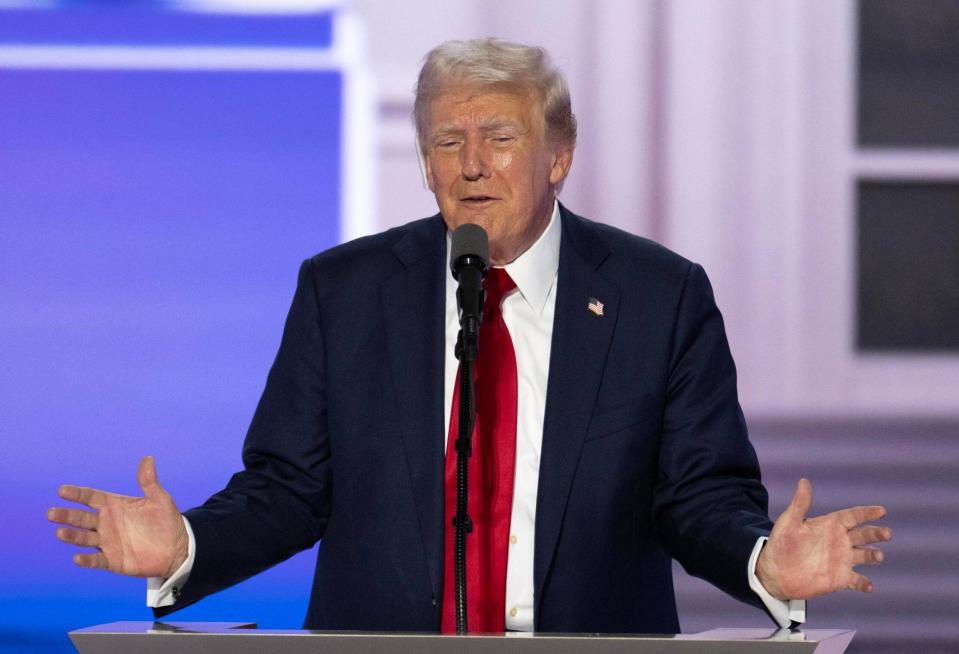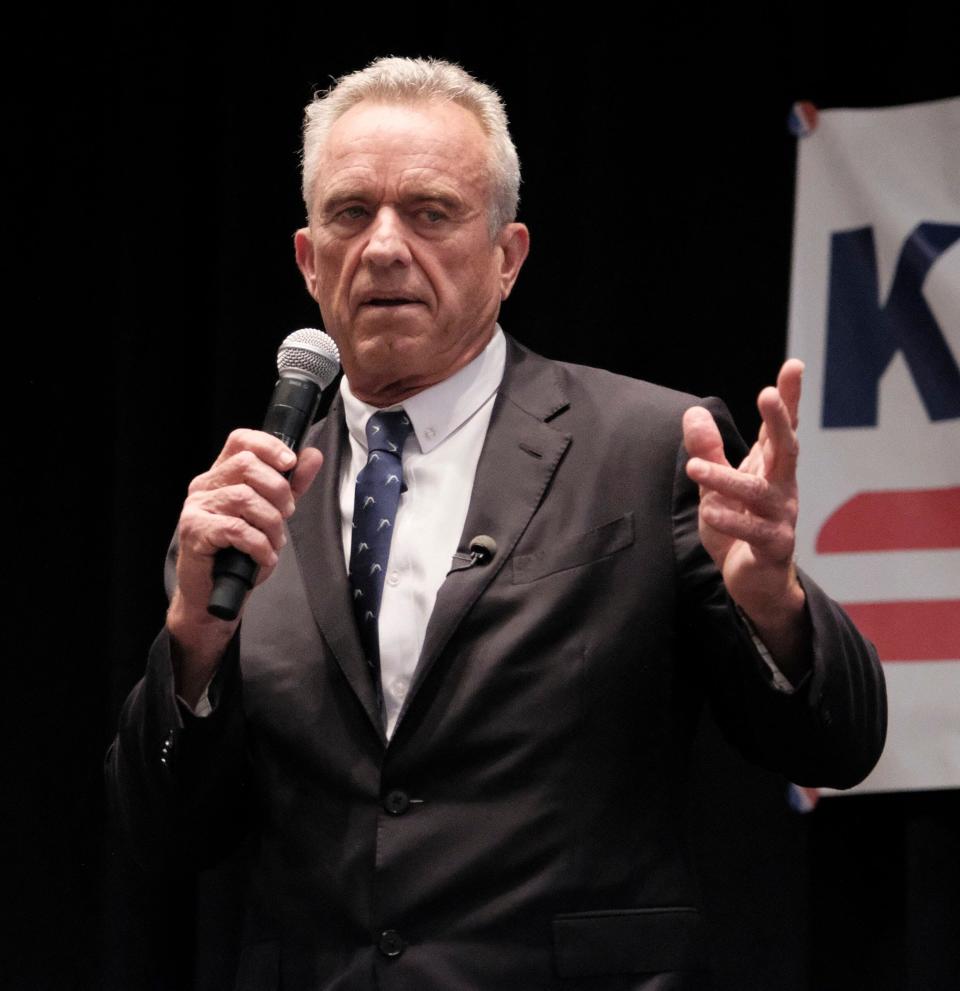Donald Trump Practically Demands Joe Rogan To Endorse Him
Kelly Coffey-Behrens
THE BLAST
Sat, October 26, 2024
Sat, October 26, 2024
Former President Donald Trump recorded a nearly three-hour episode of "The Joe Rogan Experience" on Friday, taking his message to the nation's most-listened-to podcast.
Naturally, the two aren’t unfamiliar with each other—Trump and Rogan have crossed paths at UFC events on multiple occasions over the years, as Trump is a frequent attendee. The appearance on Rogen's podcast comes as Trump aims to expand his reach among young male voters—a demographic in which Rogan holds considerable influence.
In typical rally-style, Donald Trump’s conversation with Joe Rogan touched on a mix of topics, ranging from his appearance on "The View" during his first campaign, hosting "The Apprentice," and even UFOs and dead whales.
Naturally, the two aren’t unfamiliar with each other—Trump and Rogan have crossed paths at UFC events on multiple occasions over the years, as Trump is a frequent attendee. The appearance on Rogen's podcast comes as Trump aims to expand his reach among young male voters—a demographic in which Rogan holds considerable influence.
In typical rally-style, Donald Trump’s conversation with Joe Rogan touched on a mix of topics, ranging from his appearance on "The View" during his first campaign, hosting "The Apprentice," and even UFOs and dead whales.
Donald Trump Wanted A Public Endorsement From Joe Rogan

MEGA
Trump made his long-awaited debut on "The Joe Rogan Experience" Friday night, and from the looks of it, the former president wasn’t about to leave without securing a public endorsement—right then and there!
Trump flaunted his "nicest endorsement" from Elon Musk before nudging Rogan with, "You should do the same thing, Joe."
The relentless former President of the United States pressed Rogan, dismissing any chance of him supporting Kamala Harris, even joking, "You're a Khabib [Nurmagomedov] person, but you're not a Kamala person," which earned a genuine laugh from Rogan, referencing the UFC superstar.
Despite Trump’s persistent urging, Rogan didn’t commit to endorsing him—at least, not yet—and notably didn’t rule out the possibility down the line.
Donald Trump Reveals The ‘Biggest Mistake’ He Made During His First-Term

MEGA
According to Trump, in his conversation with Rogan, he expressed regret over certain appointments made during his first term:
"The one question that you'll ask me that I think you'll ask me that people seem to ask -- and I always come up with the same answer – if I, the one mistake because I had a lot of success, great economy, great, everything was great with the military rebuilt the biggest tax cuts in history, all the stuff we did, we had a great presidency.
Three Supreme Court justices. Most people get none. You know, you pick them young this way. They're there for 50 years. Right. So, you know, even if a president is there for eight years, oftentimes they never have a chance. I had three. It was the luck of the draw."
But I will say that it always comes back to the same answer. The biggest mistake I made was I picked some people, I picked some great people, you know, but you don't think about that. I picked some people that I shouldn't have picked. I picked a few people that I shouldn't have picked."
Rogan chimed in, "And neocons," to which Trump immediately followed up, "Yeah, neocons or bad people or disloyal people."
Joe Rogan Has Previously Said Donald Trump Is Not A Dictator

Instagram | Joe Rogan
On a September 11, 2024, episode, Rogan remarked that Trump’s first term in office wasn’t as extreme as many had initially feared it might be.
"Everyone's saying he's going to be a dictator. Well, he wasn't a dictator. He was the president," Rogan said at the time. "He actually was the president for four years and the economy really did well and he really did try to cut some of the bullsh-t down that's going on in this country."
However, Rogan noted that voters seemed to wrestle more with Trump’s personality than with his policies, telling his listeners, "We don't necessarily want that as the guy with his finger on the button."
Joe Rogan Previously Declined To Interview Donald Trump

MEGA
Back in July 2022, Rogan openly shared that he had turned down multiple chances to interview Trump, making it clear he was “not a Trump supporter in any way, shape, or form.”
“I’ve had the opportunity to have him on my show more than once—I’ve said no every time. I don’t want to help him. I’m not interested in helping him,” Rogan stated firmly.
In that same episode, Rogan speculated that Trump would end up running “against a dead man,” a pointed reference to President Joe Biden, who was widely expected to be the Democratic candidate.
Joe Rogan Says Donald Trump 'Might Be A Sociopath'

MEGA
In a September 2023 episode featuring Bill Maher, Rogan seemed to present Biden and Trump as equally flawed—a comparison Maher strongly rejected.
"He might be crazy," Rogen said. "He might be a sociopath."
Why Joe Rogan Is Being Dubbed A 'Coward' After Hosting Donald Trump On Podcast
Kelly Coffey-Behrens
THE BLAST
Sat, October 26, 2024
On Friday night, former president Donald Trump finally made his much-anticipated debut on Joe Rogan's podcast, "The Joe Rogan Experience," and it seemed the former president had his sights set on securing a public endorsement before the episode wrapped.
The 45th President of the United States brought up his "nicest endorsement" from Elon Musk before urging Rogan, "You should do the same thing, Joe."
Despite Donald Trump’s repeated encouragement, Joe Rogan stopped short of an endorsement—and he is now being labeled a "coward."
Sat, October 26, 2024
On Friday night, former president Donald Trump finally made his much-anticipated debut on Joe Rogan's podcast, "The Joe Rogan Experience," and it seemed the former president had his sights set on securing a public endorsement before the episode wrapped.
The 45th President of the United States brought up his "nicest endorsement" from Elon Musk before urging Rogan, "You should do the same thing, Joe."
Despite Donald Trump’s repeated encouragement, Joe Rogan stopped short of an endorsement—and he is now being labeled a "coward."
Donald Trump Appears on Joe Rogan's Podcast

MEGA
The three-hour interview between Republican presidential nominee Trump and Rogan, America’s top podcaster, has finally dropped.
In their expansive conversation, Trump touches on topics ranging from the “biggest mistake” of his time in the White House to his interactions with North Korea’s leader and even speculations on extraterrestrial life.
Notably, Rogan once labeled Trump “an existential threat to democracy” and declined multiple invitations to host him. However, the two appeared on friendly terms during Friday’s chat, bonding over their shared interest in the "Ultimate Fighting Championship" and mutual friends like Elon Musk.
#JoeRoganIsACoward Trends On X
At one point, Trump joked, "You're a Khabib [Nurmagomedov] person, but you're not a Kamala person," drawing a genuine laugh from Rogan as he referenced the UFC icon and attempted to get an endorsement from Rogan. Though, it wasn't enough because Rogan never actually endorsed the former president.
Following the release of the podcast episode, social media users took to X, the social media platform formerly known as Twitter, using the hashtag #JoeRoganIsACoward to express their feelings.
"History will be remembered by who stood by and did nothing. #joeRoganisacoward," one user said.
"Hilarious how many pro Trump guys Rogan has had on his podcast," another began. "You would’ve thought he’d come prepared or at LEAST give a descent follow up question. Congrats Joe, you played yourself, and you are no worse than #foxnews #JoeRoganIsACoward."
"Let’s get it trending," another said, adding the hashtag #JoeRoganIsACoward.
Joe Rogan Previously Declined To Interview Donald Trump

Instagram | Joe Rogan
While Rogan has not publicly endorsed Trump, he has been publicly tied to the former president, having crossed paths at UFC events on multiple occasions over the years.
Additionally, back in July 2022, the podcaster candidly revealed that he had declined several opportunities to interview Trump, stating firmly that he was “not a Trump supporter in any way, shape, or form.”
“I’ve had the opportunity to have him on my show more than once—I’ve said no every time. I don’t want to help him. I’m not interested in helping him,” he stated at the time.
Plus, in a September 2023 episode featuring Bill Maher, Rogan said, "He might be crazy. He might be a sociopath," describing Trump.
Joe Rogan Supported RFK Jr.

MEGA
In August, Rogan voiced his support for independent presidential candidate Robert F. Kennedy Jr., offering praise for his campaign.
"I am a fan. He's the only one to make sense to me. He's the only one that doesn't attack people. He attacks actions and ideas, but he's much more reasonable and intelligent," Rogan said during an episode of his podcast.
The following day, Rogan clarified his remarks in a post on X, formerly known as Twitter, emphasizing that his praise for Robert F. Kennedy Jr. was not an “endorsement.”
"For the record, this isn't an endorsement. This is me saying that I like RFK Jr as a person, and I really appreciate the way he discusses things with civility and intelligence," Rogan wrote at the time. "I think we could use more of that in this world."
More On Joe Rogan's Controversial Podcast
Known for his marathon-length interviews on "The Joe Rogan Experience," which consistently ranks as the No. 1 podcast in the United States on Spotify’s charts, Rogan has stirred controversy over his casual language, often referring to women as “chicks.”
He also drew criticism for laughing during a conversation in which a comedian friend recounted instances of pressuring young female comics into sex.
Recently, he received immense backlash after saying “the idea that Jewish people are not into money is ridiculous."
Joe Rogan asked Donald Trump for specifics on how 2020 was stolen. Then could only laugh at the answer
Alex Lang
Sat, October 26, 2024
THE INDEPENDENT

Joe Rogan asked Donald Trump for specifics on how 2020 was stolen. Then could only laugh at the answer
Joe Rogan could be seen laughing as he pressed former president Donald Trump for specifics on how the election was stolen in 2020.
The Republican nominee sat down Friday for an interview with the No. 1 podcaster. The interview ran for three hours and delayed Trump’s appearance in Traverse City, Michigan, later in the day.
At one point, Trump and Rogan started to discuss the 2020 election.
“I won by like,” Trump said, “I lost by like…I didn’t lose.
Rogan could then be seen laughing.
“They say I lost, Joe, they say I lost by 22,000 votes,” Trump continued. “That’s like one one-tenth of one percent, it’s less than that. It’s a tiny little thing. Twenty-two thousand votes that’s spread all over this period.
“Fifty-one intelligent agents lied, they lied, they knew it was Hunter’s, it was from his bed. They said it was created by Russia. Russia, Russia, Russia. It was the Russia hoax.”

Donald Trump sat down with Joe Rogan for a podcast interview. At one point, Rogan could only laugh as Trump rambled when asked about how the 2020 election was stolen (Joe Rogan Experience)
That exchange came as Rogan continued to ask Trump for examples of how the 2020 election was “crooked” as Trump claimed.
“Let’s start at the top and the easy ones. They were supposed to get legislative approval to do the things they did, and they didn’t get it in many cases, they didn’t get it,” Trump said.
Rogan asked what the “things” were, and the Republican nominee could only say “anything.”
“Like for extensions of the voting, for voting earlier. All these different things by law, they had to get legislative approvals. You don’t have to go any further than that,” the 78-year-old nominee said.
“If you take a look at Wisconsin, they virtually admitted that the election was rigged, robbed, and stolen. They wouldn’t give access in certain areas to the ballots because the ballots weren’t signed. They weren’t originals. They were– we could go into this stuff. We could go into the ballots, or we could go into the overall. I’ll give you another way.”
The podcaster then asked Trump if he would ever present the evidence, Trump responded with “uh.” He then went into a rant about Russia and Hunter Biden’s laptop.

Trump has made his stolen election claim a central part of his campaign against Democratic rival Kamala Harris (AFP via Getty Images)
Despite there being no evidence of mass election fraud, Trump continues to push the idea that the election was stolen. It’s become a centerpiece of his campaign against Democratic rival Kamala Harris.
Earlier this month, during a Michigan rally, Trump addressed his stolen election claims as he spoke soon after prosecutor Jack Smith made a filing in the federal criminal case against the former president accusing him of election interference.
“You know last time, last election, we did great in 2016, a lot of people don’t know we did much better in 2020,” Trump told the crowd on October 4. “We won, we won, we did win. It was a rigged election, it was a rigged election.
“You have to tell Kamala Harris, that’s why I’m doing it again, if I thought I lost, I wouldn’t be doing this again. You know where I’d be right now, on the beaches of Monte Carlo maybe, or some place. Be having a nice life.”

Joe Rogan asked Donald Trump for specifics on how 2020 was stolen. Then could only laugh at the answer
Joe Rogan could be seen laughing as he pressed former president Donald Trump for specifics on how the election was stolen in 2020.
The Republican nominee sat down Friday for an interview with the No. 1 podcaster. The interview ran for three hours and delayed Trump’s appearance in Traverse City, Michigan, later in the day.
At one point, Trump and Rogan started to discuss the 2020 election.
“I won by like,” Trump said, “I lost by like…I didn’t lose.
Rogan could then be seen laughing.
“They say I lost, Joe, they say I lost by 22,000 votes,” Trump continued. “That’s like one one-tenth of one percent, it’s less than that. It’s a tiny little thing. Twenty-two thousand votes that’s spread all over this period.
“Fifty-one intelligent agents lied, they lied, they knew it was Hunter’s, it was from his bed. They said it was created by Russia. Russia, Russia, Russia. It was the Russia hoax.”

Donald Trump sat down with Joe Rogan for a podcast interview. At one point, Rogan could only laugh as Trump rambled when asked about how the 2020 election was stolen (Joe Rogan Experience)
That exchange came as Rogan continued to ask Trump for examples of how the 2020 election was “crooked” as Trump claimed.
“Let’s start at the top and the easy ones. They were supposed to get legislative approval to do the things they did, and they didn’t get it in many cases, they didn’t get it,” Trump said.
Rogan asked what the “things” were, and the Republican nominee could only say “anything.”
“Like for extensions of the voting, for voting earlier. All these different things by law, they had to get legislative approvals. You don’t have to go any further than that,” the 78-year-old nominee said.
“If you take a look at Wisconsin, they virtually admitted that the election was rigged, robbed, and stolen. They wouldn’t give access in certain areas to the ballots because the ballots weren’t signed. They weren’t originals. They were– we could go into this stuff. We could go into the ballots, or we could go into the overall. I’ll give you another way.”
The podcaster then asked Trump if he would ever present the evidence, Trump responded with “uh.” He then went into a rant about Russia and Hunter Biden’s laptop.

Trump has made his stolen election claim a central part of his campaign against Democratic rival Kamala Harris (AFP via Getty Images)
Despite there being no evidence of mass election fraud, Trump continues to push the idea that the election was stolen. It’s become a centerpiece of his campaign against Democratic rival Kamala Harris.
Earlier this month, during a Michigan rally, Trump addressed his stolen election claims as he spoke soon after prosecutor Jack Smith made a filing in the federal criminal case against the former president accusing him of election interference.
“You know last time, last election, we did great in 2016, a lot of people don’t know we did much better in 2020,” Trump told the crowd on October 4. “We won, we won, we did win. It was a rigged election, it was a rigged election.
“You have to tell Kamala Harris, that’s why I’m doing it again, if I thought I lost, I wouldn’t be doing this again. You know where I’d be right now, on the beaches of Monte Carlo maybe, or some place. Be having a nice life.”


















